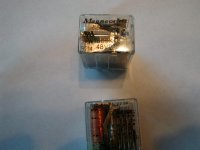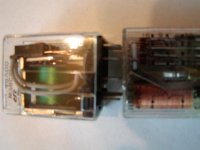Does anyone have any success stories where the output relay on a failed amplifier disconnected the speaker and prevented speaker failure? How about relays that welded.
It seems to me that the time delay for the sensing circuit to trigger plus the 10-20 millisecond delay that it takes for the relay to drop out would allow a failed amplifier to damage the woofers. Even if the voice coil doesn't burn, I'd expect the coil to jump the gap.
Very few relays have contact ratings greater than 28 VDC. Certainly the relay contacts would weld shut on most any amp good for 100 watts or more (50VDC or more rails).
It seems to me that the time delay for the sensing circuit to trigger plus the 10-20 millisecond delay that it takes for the relay to drop out would allow a failed amplifier to damage the woofers. Even if the voice coil doesn't burn, I'd expect the coil to jump the gap.
Very few relays have contact ratings greater than 28 VDC. Certainly the relay contacts would weld shut on most any amp good for 100 watts or more (50VDC or more rails).
Over the years I have experienced many failures that caused the activation of the protection circuit. The relay always prevented the sacrifice of a speaker.
I took in a SAE2200 one time that had failed and had its relay contacts welded together. Can't help but think some damage had resulted.
Most of the time it works and works well but nothing is 100% in this life. Better a relay than nothing at all.
I took in a SAE2200 one time that had failed and had its relay contacts welded together. Can't help but think some damage had resulted.
Most of the time it works and works well but nothing is 100% in this life. Better a relay than nothing at all.
I for one instance, and now have to have them
I now only use amps with an output relay. It saved me from damaging a very fragile driver once and I was a believer.
Used to use only Lowther speakers and had a set of 15 ohm, silver voice coiled PM-7A drivers in my caibinets. The amp had a cold solder joint in the feedback loop, and after months of use opened up. This dumped 33 volts dc on the output.
I was not looking at the speaker when this happened, so I did not see how far the driver jumped. But my ear facing the speaker rang for two days. The 100 dB efficient driver made an unbelievable noise. It upstair in my listening area. My wife was downstairs in another room and came running. She thought I had pulled the trigger on a 12 ga shotgun or some bomb.
The relay saved the driver, and I used it for a long time with no aftereffects. If you value your speakers, you should have a realy on the outputs.
George
I now only use amps with an output relay. It saved me from damaging a very fragile driver once and I was a believer.
Used to use only Lowther speakers and had a set of 15 ohm, silver voice coiled PM-7A drivers in my caibinets. The amp had a cold solder joint in the feedback loop, and after months of use opened up. This dumped 33 volts dc on the output.
I was not looking at the speaker when this happened, so I did not see how far the driver jumped. But my ear facing the speaker rang for two days. The 100 dB efficient driver made an unbelievable noise. It upstair in my listening area. My wife was downstairs in another room and came running. She thought I had pulled the trigger on a 12 ga shotgun or some bomb.
The relay saved the driver, and I used it for a long time with no aftereffects. If you value your speakers, you should have a realy on the outputs.
George
I would always recommend a relay protection circuit with SS amps.
Despite their problems with release times, they are a good first line of defense. Nowadays you can buy 10 Amp contact rated relays with safety breaking, i.e. designed to force open contacts that may be stuck together. My friend still has nightmares of the day his unprotected Cambridge amplifier blew the right hand channel vintage Tannoy speaker and in his ignorance, thinking it was the speaker, proceeded to wire the faulty amp channel to his left Tannoy!
He cried all day until I was able to find him a Tannoy expert to rewire the cones. Oh Boy what a day that was!
Despite their problems with release times, they are a good first line of defense. Nowadays you can buy 10 Amp contact rated relays with safety breaking, i.e. designed to force open contacts that may be stuck together. My friend still has nightmares of the day his unprotected Cambridge amplifier blew the right hand channel vintage Tannoy speaker and in his ignorance, thinking it was the speaker, proceeded to wire the faulty amp channel to his left Tannoy!
He cried all day until I was able to find him a Tannoy expert to rewire the cones. Oh Boy what a day that was!
Quad in their 405 power amp used a triac as a crowbar across the speaker outputs.A 15k resistor & 10mf cap set the time constant, but a diac in the gate meant around 30volts dc offset would be needed before it would operate.Seem to remember it was really to provide protection for their elecrostatic speakers.Doug Self's articles in "Electronics World" mag back in the 90's investigated relays, and I think he covered such things as drop out time.How saturated the magnetic core of the relay is has a large effect on how quickly the relay will "let go".Run it at as low a current as it will reliably hold.Also set your time constants on the safe side, for e.g. ask yourself do you really need to produce 100watts at 5Hz.Design your offset detection circuit to react as fast as possible.
Karl
Karl
Mooly said:… but a diac in the gate meant around 30volts dc offset would be needed before it would operate…
http://pdf1.alldatasheet.com/datasheet-pdf/view/82620/ETC/2N4992.html
Mooly
The “diac” used in Quad 405 is a 9V device as you could confirm in the datasheet…
Some info about relay drop-out times,etc. can be found on the ESP site.
http://sound.westhost.com/project33.htm
http://sound.westhost.com/project33.htm
http://www.meyersound.com/pdf/products/legacy/ms-1000a.pdf
This amplifier has a couple of protection solutions that I like:
Page 65- Reles K1 and K2 short-circuit the outputs to ground.
Page 68- Simultaneously the SCR1 and SCR2 disconnect the transfo from capacitors.
Page 69- Mosfet discharges rail capacitors trough 40ohm resistor.
This amplifier has a couple of protection solutions that I like:
Page 65- Reles K1 and K2 short-circuit the outputs to ground.
Page 68- Simultaneously the SCR1 and SCR2 disconnect the transfo from capacitors.
Page 69- Mosfet discharges rail capacitors trough 40ohm resistor.
d3imlay said:Does anyone have any success stories where the output relay on a failed amplifier disconnected the speaker and prevented speaker failure? How about relays that welded.
It seems to me that the time delay for the sensing circuit to trigger plus the 10-20 millisecond delay that it takes for the relay to drop out would allow a failed amplifier to damage the woofers. Even if the voice coil doesn't burn, I'd expect the coil to jump the gap.
Very few relays have contact ratings greater than 28 VDC. Certainly the relay contacts would weld shut on most any amp good for 100 watts or more (50VDC or more rails).
Actually, there are relays rated at thousands of volts and thousands of amps.
The response time isn't usually an issue as relays are for disconnecting in the case of DC offset more than catastrophic failures
Try a fuse
.
Yes there are very high powered relays !we call them contactors
I have used them with great success in power amplifier spk protection and I would prefer them in every case to any solid state protection scheme
They can be designed so that all amplifier condition must be correct before connecting the load(speaker)
They can provide with suitable circuits switch on thump prevention They are used to completly isolate the spk if there is a fault I am with them every time
regards Trev
I have used them with great success in power amplifier spk protection and I would prefer them in every case to any solid state protection scheme
They can be designed so that all amplifier condition must be correct before connecting the load(speaker)
They can provide with suitable circuits switch on thump prevention They are used to completly isolate the spk if there is a fault I am with them every time
regards Trev
- Status
- This old topic is closed. If you want to reopen this topic, contact a moderator using the "Report Post" button.
- Home
- Amplifiers
- Solid State
- Output relay success stories

